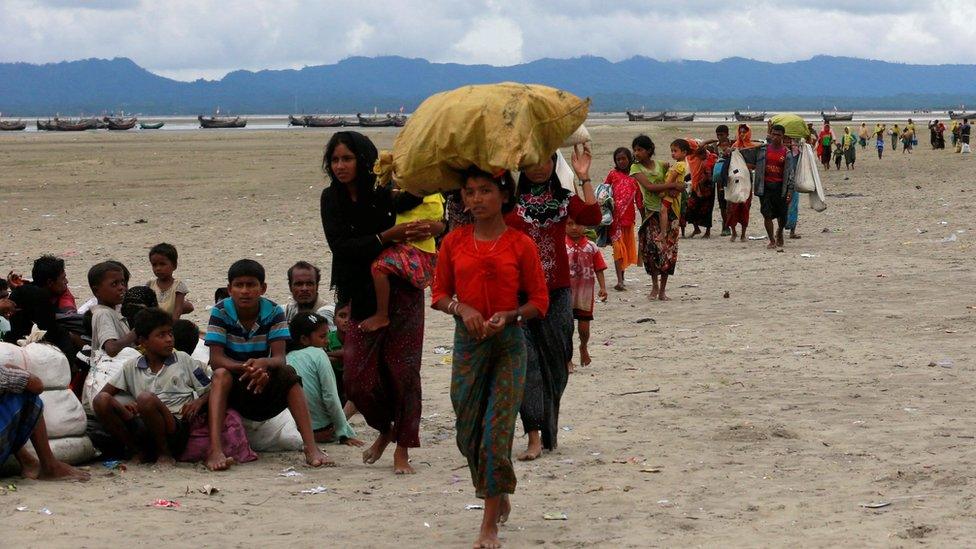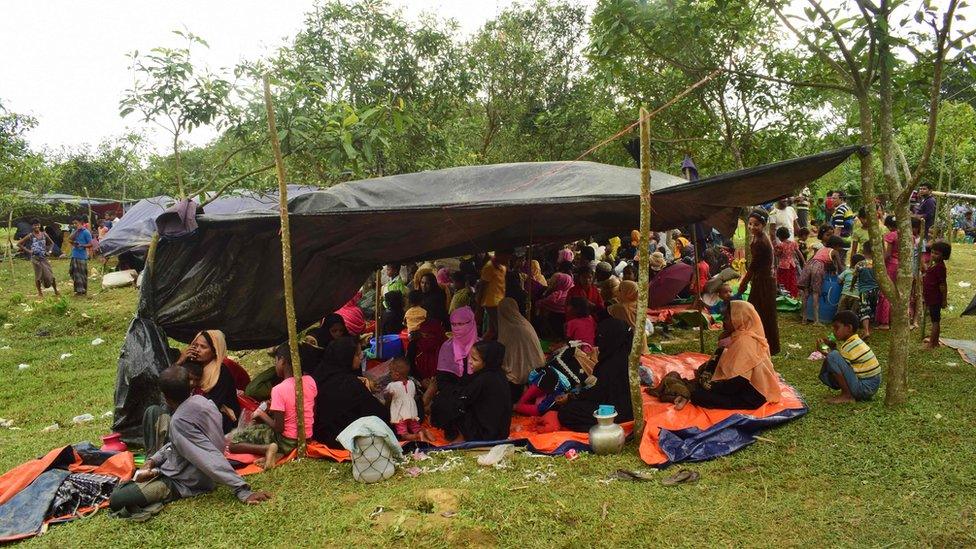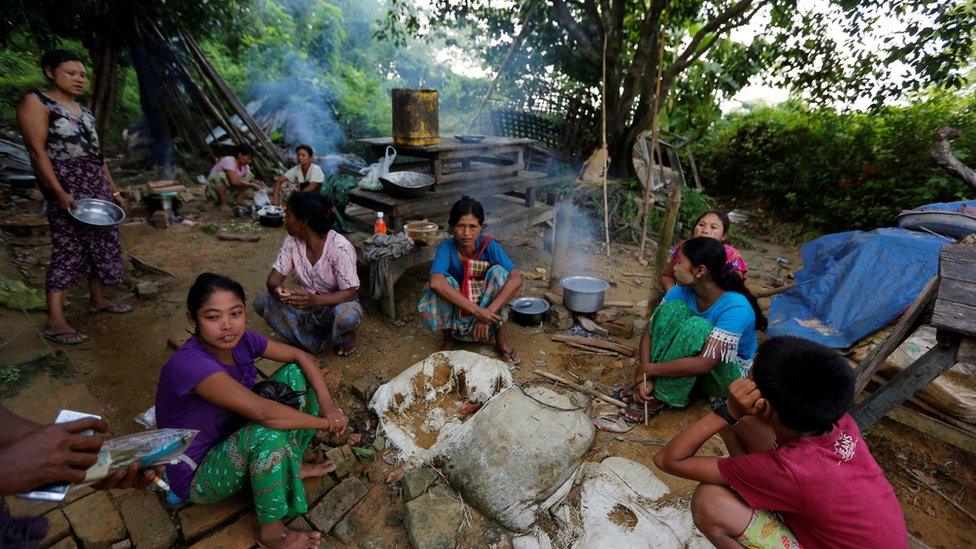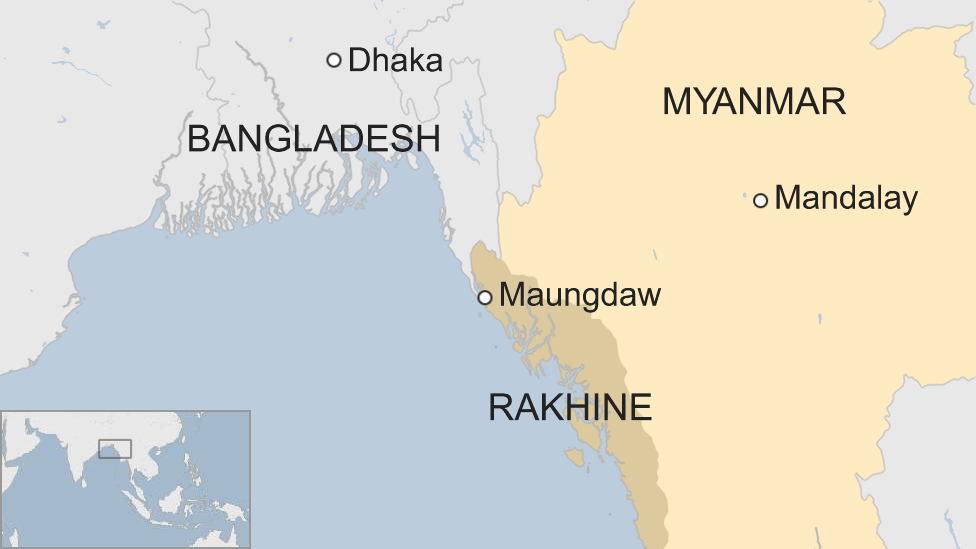Myanmar: What sparked latest violence in Rakhine?
- Published

Rohingya Muslims have been pouring into Bangladesh since 25 August
A fresh outbreak of violence in Myanmar's Rakhine state has caused hundreds of thousands of Rohingya civilians to flee to Bangladesh.
The exodus began on 25 August after Rohingya militants attacked police posts, killing 12 members of the security forces.
Those attacks led to a security crackdown. Myanmar's military says it is fighting insurgents but those who have fled say troops and Rakhine Buddhists are conducting a brutal campaign to drive them out.
The Rohingya - a stateless mostly Muslim minority group - have faced years of persecution in Myanmar. Deep-seated tensions between them and the majority Buddhist population in Rakhine have led to deadly communal violence in the past.
When did the latest violence start?
On 25 August Rohingya insurgents armed with knives and home-made bombs attacked more than 30 police posts in northern Rakhine, the government said.
Huge numbers of Rohingya civilians then began fleeing over the border into Bangladesh.
Many of them say that Burmese troops, backed by local Buddhist mobs, began burning their villages and attacking and killing civilians in response to the 25 August attacks. Some of those who have arrived in Bangladesh have bullet or other wounds.
Observers on the ground and satellite images confirm many razed Muslim villages across northern Rakhine state.

Aid agencies say those who have fled need food and shelter
The Myanmar military accuses the militants and the Rohingyas of burning their own homes. But a BBC reporter saw one case of burning that appeared to contradict the official narrative and the UN human rights chief, Zeid Raad Al Hussein, has called on the military to "stop pretending" that Muslims are burning their own homes.
Speaking on 11 September, Mr Zeid said the security operation in Myanmar seems "a textbook example of ethnic cleansing".
It is not clear how many people have died. The military gave a toll of 400 on 1 September and said most of those were militants. But a UN human rights official said a week later that she thought the number could be over 1,000. Verifying the situation on the ground is difficult because access is restricted.

Rakhine Buddhists have also left their homes to head to safer parts of the state, reports say
What is the situation at the border?
The number of Rohingya seeking safety in Bangladesh had been steadily rising since 25 August, and turned into a flood by early September.
The UN says more than 410,000 Rohingya have fled to Bangladesh since the attacks. Many have arrived with injuries they say were sustained in the crackdown. Several dozen are reported to have drowned trying to cross the Naf River into Bangladesh.
The BBC's Justin Rowlatt on the situation at the Bangladesh border
Early on there were reports of people being turned back at the border but that is no longer the case. Aid agencies and the UN are working to provide food, water and shelter for the huge influx.
Bangladesh is already home to hundreds of thousands of Rohingya refugees who have fled previous outbreaks of violence in Myanmar. But existing refugee camps are now full, so the new arrivals are sleeping in any space they can find.
Inside Myanmar, early on there were reports of Rakhine Buddhists moving south to escape the violence.
Who are the militants?
A group called the Arakan Rohingya Salvation Army (Arsa) says it carried out the 25 August attacks. The group first emerged in October 2016, when it carried out similar assaults on police posts, killing nine police officers.
It says its main aim is to protect the Rohingya Muslim minority from state repression in Myanmar.
The government says Arsa is a terrorist group whose leaders have been trained abroad. Arsa's leader is Ata Ullah, a Rohingya born in Pakistan who was raised in Saudi Arabia, according to the International Crisis Group, external.
But a spokesman for the group told Asia Times, external that it had no links to jihadist groups and that its members were young Rohingya men angered by events since communal violence in 2012.
What are the Rohingyas' grievances?
Myanmar's government claims the Rohingya are illegal immigrants from Bangladesh and denies them citizenship, even though many say they have been there for generations. Bangladesh also denies they are its citizens.
Watch: Who are the Rohingya?
Many are living in temporary camps after being forced from their villages by the wave of communal violence that swept Rakhine in 2012. They live in one of Myanmar's poorest states, and their movements and access to employment are severely restricted.
After the first attacks by Arsa in October 2016, many Rohingya accused the security forces of rape, killings, burning villages and torture during a subsequent crackdown. The UN is now carrying out a formal investigation, although the military denies wrongdoing.
The UN human rights chief says rights violations in Rakhine have almost certainly contributed to the growth of Rohingya extremism.
What has Myanmar said?
Myanmar's de facto leader Aung San Suu Kyi is facing mounting international criticism over her failure to protect the Rohingya.
Fellow Nobel Peace laureates - including Pakistani schoolgirl Malala Yousafzai, the Dalai Lama and South Africa's anti-apartheid campaigner Archbishop Desmond Tutu - have called on her to do more to end the violence.
Early on Ms Suu Kyi - who faces strong domestic anti-Rohingya sentiment and governs a nation in which significant power remains concentrated in the military - claimed the crisis was being distorted by a "huge iceberg of misinformation".
Aung San Suu Kyi: 'We will accept refugees who want to return'
In a speech to the nation on 19 September she condemned "all human rights violations and unlawful violence", saying she felt "deeply for the suffering of all the people caught up in the conflict".
She said she wanted to find out why so many people were fleeing, but also pointed out that many Muslims had chosen to stay in Rakhine. She said people verified as refugees would be able to return home.
Responding to her speech, rights group Amnesty accused her government of "burying their heads in the sand" and said Rohingya refugees could not "return to this appalling status quo".
The plight of the Rohingya has sparked protests in many Muslim nations, including Indonesia, Pakistan and Malaysia.
